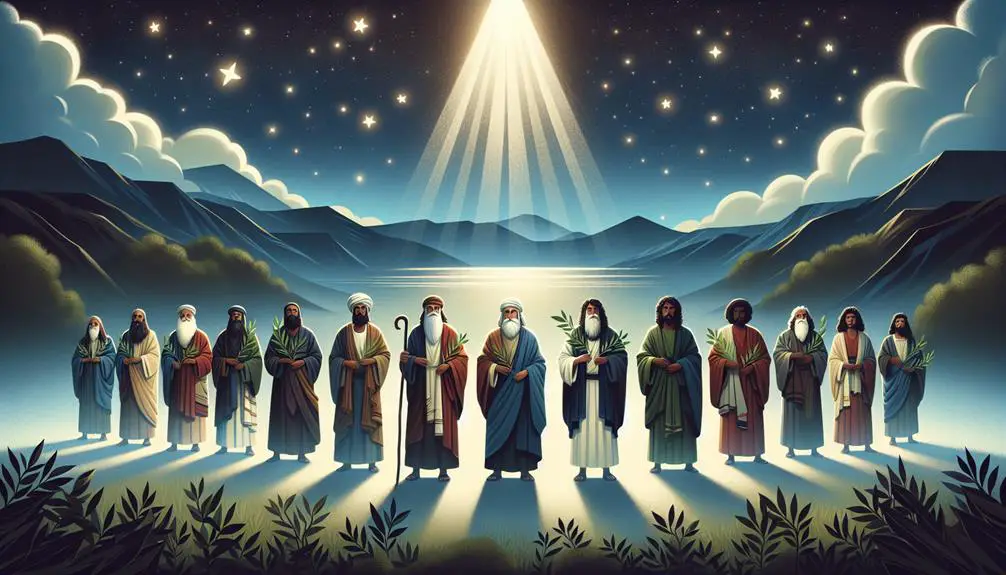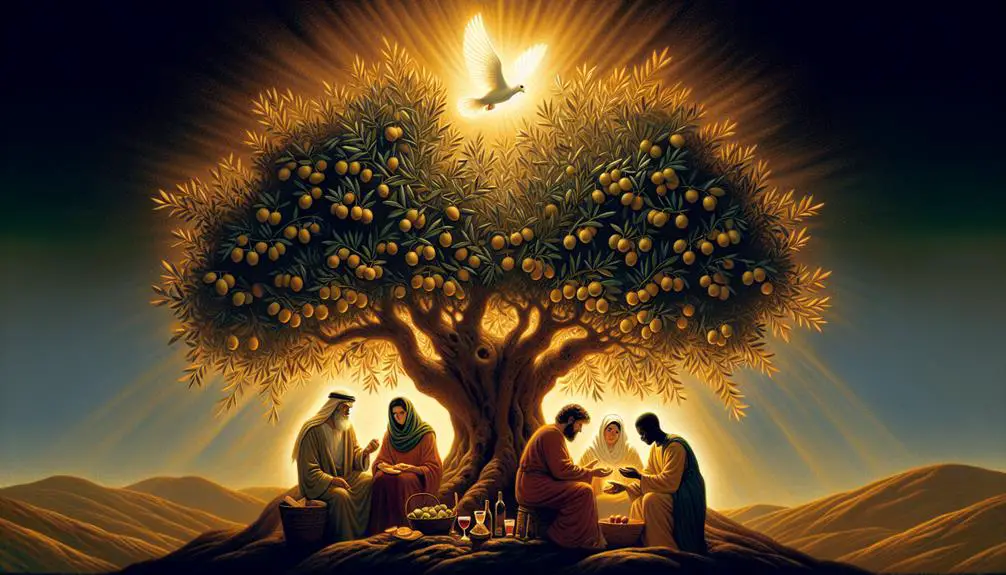From ancient texts to modern faith, discover how the Abrahamic blessing shapes generations and promises, sparking curiosity and deeper understanding.

Abrahamic Blessing in the Bible
Navigating the concept of the Abrahamic blessing in the Bible is akin to unearthing hidden treasures within ancient texts.
You'll discover that this blessing, first bestowed upon Abraham, isn't merely a historical footnote; it's a cornerstone that underpins the faith and inheritance of countless generations.
From its origins with Abraham to its fulfillment in the New Testament, you'll find yourself on a journey through promises of nations and kings, and echoes of this blessing in unexpected places.
Let's explore how this ancient promise continues to ripple through time, inviting you to uncover its relevance and impact today.
Key Takeaways
- The Abrahamic blessing encompasses promises of land, numerous descendants, and blessings to all nations, originating from God's covenant with Abraham.
- It symbolizes a divine legacy through Isaac and Jacob, transforming and shaping spiritual identities and family dynamics across generations.
- The inclusion of Gentiles in the covenant's promise, emphasized in the New Testament, marks a significant evolution towards universal inclusivity.
- Apostolic interpretations in Christianity affirm the covenant's fulfillment in Jesus, redefining its boundaries to embrace all nations and backgrounds.
Origins of the Blessing

The origins of the Abrahamic blessing trace back to pivotal moments in the Book of Genesis, where God's covenant with Abraham sets a foundational narrative for the blessings that follow. Within this cultural context, the Abrahamic blessing isn't merely a divine promise but a complex interplay of faith, obedience, and ritual significance that underscores the relationship between deity and worshippers in ancient times.
Delving into the cultural context, it's essential to understand that in the ancient Near East, blessings were more than words; they were seen as powerful, tangible forces that could shape destinies. The Abrahamic blessing, therefore, isn't just a narrative detail but a reflection of the profound belief in the power of spoken blessings to influence the material and spiritual realms.
The ritual significance of the Abrahamic blessing lies in its formalization of the covenant between God and Abraham. This wasn't simply a verbal agreement but a sacrosanct ritual that defined the relationship between the divine and the chosen people. In this light, the blessing serves as both a promise and a command, with its fulfillment contingent upon the adherence to the terms set forth by the covenant.
In analyzing the origins of the Abrahamic blessing, it's clear that the cultural underpinnings and ritualistic practices of the time played a crucial role in shaping the narrative. The blessing itself emerges not just as a divine favor, but as a complex symbol of faith, obedience, and the eternal bond between God and His people.
Promises to Abraham

You'll find that the promises made to Abraham are foundational to understanding the Abrahamic blessing. Genesis 12:1-3 outlines God's covenant, promising Abraham land, numerous descendants, and that through him all nations would be blessed (Levenson, 1985).
These elements not only signify a divine favor but also articulate a complex relationship between faith, identity, and divine purpose within the biblical narrative.
God's Covenant With Abraham
In examining God's covenant with Abraham, it's crucial to recognize how this foundational agreement forms the bedrock of Abrahamic faiths, delineating promises that have shaped millennia of religious thought and practice. This covenant, marked by sacrificial obedience, underscores the profound relationship between the divine and humanity.
Here are three key aspects:
- Abrahamic Faith: The covenant establishes a unique faith lineage, emphasizing unwavering trust in God's promises.
- Sacrificial Obedience: Abraham's willingness to sacrifice his son Isaac epitomizes the depth of faith and obedience expected within this covenant.
- Blessing to Nations: Abraham's descendants, through their covenantal relationship, are promised to be a source of blessing to all nations, intertwining their fate with humanity's spiritual journey.
Understanding these elements offers deep insights into the covenant's enduring significance.
Land and Descendants Promise
Central to God's covenant with Abraham are the promises of land and numerous descendants, serving as foundational pillars that not only affirm Abraham's faith but also establish a perpetual legacy impacting countless generations. This dual assurance encapsulates a vision of agricultural prosperity and economic stability.
The land, often depicted as flowing with milk and honey, symbolizes a fertile ground for growth and sustenance (Gen 12:1-3). It's a place where Abraham's descendants could thrive, cultivating the land and reaping the benefits of their labor.
Meanwhile, the promise of numerous descendants signifies a flourishing lineage, ensuring Abraham's legacy and influence would endure through ages. These promises intertwine, as the land provides the means for the descendants' survival and prosperity, underpinning the covenant's significance in fostering a stable, prosperous community.
Blessing to Nations Pledge
Beyond the promises of land and a multitude of descendants, God's covenant with Abraham encompasses a profound pledge that extends blessings to all nations through him (Gen 12:3). This promise holds vast cultural significance and invites diverse modern interpretations.
- Cultural Significance: The pledge underscores the universal nature of Abraham's covenant, illustrating a foundational belief in the interconnectedness of humanity.
- Modern Interpretations: Scholars and theologians often debate the scope of this blessing, considering its implications for contemporary global relations and ethical responsibilities.
- Theological Implications: This promise suggests a divine strategy for redemption and peace, transcending ethnic and national boundaries, which challenges believers to adopt a more inclusive and loving worldview.
Analyzing this pledge reveals its enduring relevance, urging a reevaluation of our role in fostering global unity and understanding.
Isaac's Inheritance

As a pivotal figure in the narrative, Isaac's inheritance not only symbolizes divine promise but also establishes a lineage critical to understanding Abrahamic blessings within biblical scholarship. This inheritance, deeply intertwined with themes of faith and covenant, becomes a cornerstone for the unfolding events that shape the destiny of a nation. From Esau's perspective, the inheritance represents not only material wealth but also the continuation of a divine promise—a concept that's further complicated by the sacrificial test Abraham faces (Genesis 22). This moment, where faith is profoundly tested, echoes through Isaac's own experiences and the decisions he makes regarding his descendants.
Isaac's role in the transmission of Abrahamic blessings is multifaceted. On one hand, his near-sacrifice underscores the depth of Abraham's faith and the complexities of divine-human relationships. On the other, Isaac's interactions with his sons, Esau and Jacob, reflect the human dimension of these divine promises. The dynamics between Esau and Jacob, particularly in the context of the birthright and blessing, illustrate the tangible and immediate consequences of these spiritual legacies.
Scholars often highlight how Isaac's inheritance goes beyond material wealth, encompassing spiritual blessings and the promise of numerous descendants (Gen. 26:3-4). This intertwining of the spiritual and material in Isaac's inheritance not only reflects the multifaceted nature of Abrahamic blessings but also sets the stage for the continued unfolding of this promise through his descendants. In this sense, Isaac's inheritance serves as a bridge between Abraham's initial covenant with God and the eventual establishment of the Israelites as a nation chosen to carry forward this divine promise.
Jacob's Encounter

You'll find that Jacob's encounter at Peniel, as documented in Genesis 32:24-32, represents a pivotal moment in the narrative of the Abrahamic blessing. This event, where Jacob wrestles with a divine figure and has his name changed to Israel, signifies a transformation that extends beyond the personal to the national identity of the Israelites.
Scholars like Westermann (1995) argue that the blessing's generational impact, highlighted through this name change, underscores the enduring nature of the covenant established with Abraham.
Jacob Wrestles at Peniel
In a pivotal moment recorded in Genesis 32:24-32, Jacob wrestles with a mysterious figure at Peniel, marking a significant transformation in his life and legacy. This divine wrestling and night struggle symbolize deep spiritual truths and are rich with theological implications. Consider the following:
- Divine Encounter: Jacob's wrestling isn't merely physical but represents a profound spiritual engagement with God, showcasing a transformative divine encounter.
- Persistence in Struggle: The night-long struggle underscores the persistence and resilience required in one's faith journey, emphasizing endurance in seeking divine blessings.
- Transformation and Blessing: Though not explicitly mentioning the outcome here, the struggle at Peniel is a precursor to significant changes in Jacob's identity and his reception of blessings, highlighting the link between struggle and spiritual evolution.
Name Changed to Israel
Building on the profound encounter at Peniel, Jacob's identity undergoes a monumental shift when his name is changed to Israel, marking a pivotal moment in his spiritual journey and legacy. This transformation isn't merely symbolic; it signifies the resolution of an identity crisis through divine intervention.
Angelic visitations, particularly this wrestling match with a divine being, serve as a crucible for Jacob's character and destiny. Scholars argue that this renaming signifies a transition from a life marked by deception and struggle to one of leadership and covenant with God (Gen. 32:28).
This moment transcends a personal victory; it's a foundational event for the nation of Israel, embedding the concept of struggle and divine favor within the very identity of Jacob's descendants.
Blessing's Generational Impact
Jacob's transformation into Israel doesn't just reshape his personal narrative; it casts a long shadow over the generations that follow, embedding a legacy of divine favor and covenantal promise into the very foundation of his descendants' identity. This transformation influences:
- Family dynamics: The blessing becomes a cornerstone for understanding roles and relationships within Jacob's lineage, influencing decisions and actions.
- Cultural interpretations: How various cultures and traditions interpret Jacob's blessing affects the perception of divine favor and covenantal relationships today.
- Generational identity: The notion of being part of a chosen lineage shapes the self-perception and purpose of Jacob's descendants.
This analysis highlights the profound impact of Jacob's encounter and subsequent blessing on family dynamics and cultural interpretations, underpinning the generational identity of his lineage.
Nations and Kings

You'll find that the Abrahamic blessing, as delineated in the Bible, encompasses promises of nations and kings descending from Abraham, illustrating a foundational aspect of biblical history and theology. This covenant, initially laid out in Genesis 12:1-3, sets a precedent for the intertwining of divine promise with the earthly manifestations of economic prosperity and cultural influence. Scholars like Wenham (1994) and Hamilton (1995) argue that these promises aren't merely spiritual or ethereal but have tangible implications for the development of societies and governance structures rooted in Abrahamic lineage.
The narrative arc from Abraham to the establishment of Israel as a nation, and the crowning of kings like David and Solomon, underscores a divine strategy for societal organization. This evolution is marked by significant economic prosperity, as seen in Solomon's reign, which is often depicted as a golden era of wealth and wisdom (1 Kings 4:20-34). Furthermore, the cultural influence exerted by these Abrahamic descendants shaped the Near East's religious and socio-political landscape profoundly.
This biblical promise of nations and kings, therefore, not only fulfilled a divine covenant but also set a framework for understanding how divine blessing can manifest in governance and societal welfare. The Abrahamic covenant's unfolding reveals a complex interplay between divine promise and human history, where the elements of economic prosperity and cultural influence serve as indicators of the blessing's materialization. This narrative invites further exploration into how these themes of nationhood and leadership continue to resonate through subsequent biblical stories and their historical contexts.
The Blessing in Exodus

Having explored the Abrahamic blessing's impact on nations and kings, we now turn our attention to how these promises continue to unfold in the narrative of Exodus, highlighting the enduring legacy of Abraham's covenant with God.
In Exodus, the manifestation of this blessing becomes evident through:
- Moses' Leadership: Moses emerges as a central figure, embodying the fulfillment of God's promise to Abraham. His role in leading the Israelites out of Egypt signifies not just a physical liberation but also the continuation of a divine legacy. Moses' leadership, characterized by faith and obedience, serves as a conduit for the blessings promised to Abraham's descendants.
- Pharaoh's Defiance: The Pharaoh's resistance against letting the Israelites go underscores the struggle between divine will and human obstinacy. This defiance ultimately leads to the demonstration of God's power and sovereignty, reinforcing the idea that the Abrahamic blessing is irrevocable and will triumph over human opposition.
- The Exodus Event: The actual departure from Egypt marks a pivotal moment in the enactment of the Abrahamic covenant. This event isn't just a historical moment of liberation but also a theological affirmation of God's faithfulness to His promises. The Exodus encapsulates the journey from bondage to freedom, highlighting the fulfillment of the blessings promised to Abraham's lineage.
Through the Prophets

The prophetic voices in the Hebrew Bible further illuminate the ways in which the Abrahamic blessing permeates the narrative of Israel's history, shaping its identity and destiny. These prophets, acting as intermediaries between the divine and the people, frequently reference the covenantal promises made to Abraham, reinforcing the notion that Israel's story is a continuation of a spiritual lineage that began with him. Through their prophetic visions, they not only remind Israel of its obligations under this covenant but also of the blessings that adherence to it brings.
Isaiah, for instance, speaks of a future in which all nations will be blessed through Israel, echoing the Abrahamic promise of blessing to all peoples (Isaiah 2:2-4). This vision expands the scope of the blessing, suggesting that the spiritual lineage of Abraham will have a universal impact, transcending geographic and ethnic boundaries. Jeremiah, too, reinforces the continuity of the Abrahamic blessing, even in the midst of Israel's failings and the threat of exile. He prophesies a new covenant, one that will write the law in the hearts of the people, ensuring that the relationship between God and Israel, initiated through Abraham, will endure (Jeremiah 31:31-34).
These prophetic narratives underscore that the Abrahamic blessing isn't a static relic of the past but a dynamic, living promise that guides and shapes the communal and spiritual identity of Israel. They highlight that the fulfillment of this blessing is an ongoing process, deeply intertwined with the faithfulness and actions of the people within this spiritual lineage.
New Testament Fulfillment

Building on the prophetic visions of the Hebrew Bible, the New Testament presents the fulfillment of the Abrahamic blessing through the life, death, and resurrection of Jesus Christ, explicitly linking this historical figure to the covenant's universal promise. The Apostolic interpretations of Jesus' mission and teachings reframe the Abrahamic covenant, emphasizing its inclusivity and ultimate realization in the Christian faith. This transition marks a pivotal reinterpretation, expanding the covenant's reach beyond the Jewish people to encompass Gentiles, thereby fulfilling the promise of blessing to all nations.
Key aspects of this fulfillment include:
- Gentile Inclusion: Paul's letters, especially to the Galatians and Romans, articulate the inclusion of Gentiles into God's covenant with Abraham. Paul argues that faith in Christ Jesus allows Gentiles to be grafted into the family of Abraham, becoming heirs to the promise (Galatians 3:7-9, 28-29; Romans 4:13-17).
- Apostolic Interpretations: The Apostles, as seen in Acts and the Epistles, interpret Jesus' life and ministry as the mechanism through which the Abrahamic blessing reaches its full, intended scope. Peter's vision in Acts 10 and Paul's mission work among Gentile communities exemplify this expanded understanding.
- Universal Promise Realization: The Revelation to John envisions the fulfillment of the Abrahamic blessing in the eschatological gathering of people from every nation, tribe, people, and language, worshiping before the throne of God and the Lamb (Revelation 7:9-10), symbolizing the ultimate fulfillment of the covenant's promise to bless all nations.
The New Testament's portrayal of Jesus' ministry affirms and expands the Abrahamic covenant, emphasizing its universal scope and the inclusivity of Gentile believers, thus marking a significant evolution in the understanding of God's promise to Abraham.
Frequently Asked Questions
How Has the Concept of the Abrahamic Blessing Influenced Modern Interfaith Dialogues Between Judaism, Christianity, and Islam?
You've noticed how interfaith initiatives often hinge on shared religious narratives.
In dialogues between Judaism, Christianity, and Islam, interpretations of foundational blessings play a pivotal role. These discussions leverage common ground in blessing interpretations to foster understanding and cooperation.
Are There Any Archaeological Findings That Directly Support the Narrative of the Abrahamic Blessing as Described in the Bible?
You're looking into whether archaeological findings back the narrative you've heard about. While there's no direct evidence confirming the story exactly as told, many findings hint at the historical authenticity and cultural impact of the era.
Scholars reference these to understand how ancient events have shaped modern beliefs. It's a complex puzzle, but each piece helps us appreciate the profound influence of these ancient stories on today's interfaith dialogues.
How Do Contemporary Theologians Reconcile the Notion of the Abrahamic Blessing With the Challenges of Modern Secularism and Atheism?
You're diving into the deep end, pondering how theologians today square up ancient beliefs with modern skepticism.
They're not pulling rabbits out of hats; instead, they meticulously analyze the overlap between secular ethics and atheistic morality with traditional teachings.
By dissecting texts and historical contexts, they find common ground, arguing that core values transcend time and belief systems.
This scholarly dance offers a compelling narrative that bridges ancient wisdom with contemporary challenges.
In What Ways Has the Abrahamic Blessing Been Interpreted or Reinterpreted in Contemporary Cultural or Literary Works?
You'll find that contemporary cultural or literary works often reinterpret the notion traditionally associated with blessings. Literary adaptations and cultural reinterpretations creatively engage with these themes, infusing them with modern values and perspectives.
For instance, novels and films might explore themes of faith, promise, and inheritance in ways that resonate with today's audiences, reflecting broader societal shifts. These reinterpretations invite you to reconsider the relevance and application of ancient concepts in a modern context.
How Do Non-Abrahamic Religions or Belief Systems View or Parallel the Concept of a Divine Blessing Similar to the Abrahamic Blessing?
In exploring divine blessings outside Abrahamic faiths, you'll find Hindu Karma and Buddhist Merit echo similar concepts. Hinduism teaches that your actions directly impact your future, a form of spiritual blessing or curse.
In Buddhism, accumulating merit through good deeds influences your path, akin to earning blessings. Both systems emphasize personal responsibility in securing divine favor, paralleling the idea of being blessed through adherence to moral and ethical conduct.
Conclusion
In the tapestry of biblical narrative, the Abrahamic blessing weaves a thread from antiquity to eschatology, juxtaposing earthly inheritance with divine promise. From Abraham's call to Isaac's legacy, and through Jacob's wrestling, this blessing transcends generations, embodying both material prosperity and spiritual lineage.
Exodus and the prophets amplify its scope, culminating in the New Testament's Christocentric fulfillment (Gal. 3:8). Analytically, this dynamic interplay between temporal blessings and eternal covenant underscores God's unyielding faithfulness across dispensations, illustrating a divine strategy that marries historical continuity with theological depth.



Sign up